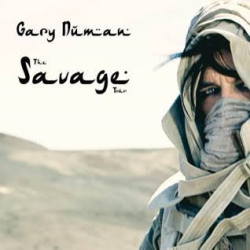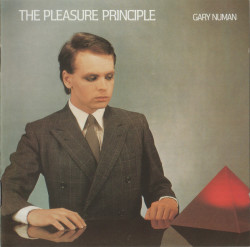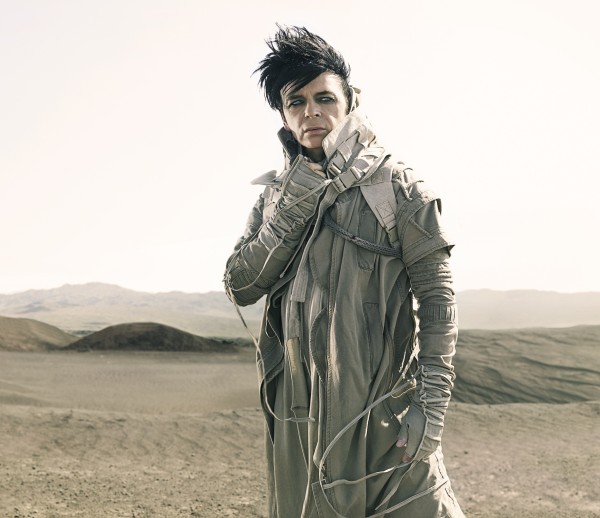![]() BY DAVID R. STAMPONE If you’ve been out of the loop on Gary Numan in recent years, you may not know that the highly influential (Nine Inch Nails to Afrikaa Bambaataa et al.) English new wave synth-rock star with the erstwhile icy android persona has become quite active again in the new millennium. Hugely popular through the very late ‘70s/ early ‘80s w #1 singles and albs, he’s in a very good place at age 59, having come to grips with issues like a decline in creative interest and his (eventually diagnosed) Asperger’s syndrome some time ago. (An engaging account of Numan’s struggles and rebirth can be found on last year’s documentary Android In La La Land.) These days, he’s happily if no less seriously making quality, ominously textured records, touring and raising his family out in sunny Southern California, where he moved earlier this decade. And on a phone chat the other day, done in anticipation of Numan playing Philadelphia’s Union Transfer on Wednesday (Dec. 6) and The Chameleon Club in Lancaster on Friday (Dec. 8th), he proved quite the amiable chap. DISCUSSED: Savage (Songs From A Broken World), his 22nd studio album, released in September; performing circa now vs. the late ’70s/early ’80s heyday of New Wave; Middle Eastern music appreciation/appropriation; global warming and Trump pulling the USA out of the Paris Agreement; just how adept his young daughter is as a vocalist. Not asked (in ref to Numan’s 1st chart-topper, released in 1979): “Are ‘Friends’ Electric?”
BY DAVID R. STAMPONE If you’ve been out of the loop on Gary Numan in recent years, you may not know that the highly influential (Nine Inch Nails to Afrikaa Bambaataa et al.) English new wave synth-rock star with the erstwhile icy android persona has become quite active again in the new millennium. Hugely popular through the very late ‘70s/ early ‘80s w #1 singles and albs, he’s in a very good place at age 59, having come to grips with issues like a decline in creative interest and his (eventually diagnosed) Asperger’s syndrome some time ago. (An engaging account of Numan’s struggles and rebirth can be found on last year’s documentary Android In La La Land.) These days, he’s happily if no less seriously making quality, ominously textured records, touring and raising his family out in sunny Southern California, where he moved earlier this decade. And on a phone chat the other day, done in anticipation of Numan playing Philadelphia’s Union Transfer on Wednesday (Dec. 6) and The Chameleon Club in Lancaster on Friday (Dec. 8th), he proved quite the amiable chap. DISCUSSED: Savage (Songs From A Broken World), his 22nd studio album, released in September; performing circa now vs. the late ’70s/early ’80s heyday of New Wave; Middle Eastern music appreciation/appropriation; global warming and Trump pulling the USA out of the Paris Agreement; just how adept his young daughter is as a vocalist. Not asked (in ref to Numan’s 1st chart-topper, released in 1979): “Are ‘Friends’ Electric?”
PHAWKER: It’s interesting to note that folks see you as an archetypal synth-rock artist but that you got an acoustic guitar at age 5 and a Les Paul at age 15 – so you were a guitarist first, right?
GARY NUMAN: Yeah, I did start out that way. When I got signed to my first record deal, to the Beggars Banquet label in 1978, it was as a guitar-playing singer in a punk band (Tubeway Army). Never played a keyboard in my life up until that point. But then I discovered synthesizers … and in terms of writing, I do it all on keyboards.
PHAWKER: You seem so well-adjusted to performing now, to enjoy it – which didn’t always appear to be the case?
GARY NUMAN: It’s definitely a change from when I started. I was never entirely comfortable being onstage; I preferred to be at home, writing songs. But then, as time went on, all the things that you might think make touring uncomfortable happened and I realized it’s wasn’t so bad. I began to see the good side of it. And whereas in the beginning, I wasn’t that keen on the travelling and being away from home, now that’s not the case – my wife comes along with me and we even have [our three daughters] come out for hunks of it. I’m very comfortable being onstage now and I’ve been doing it almost 40 years. It’s just great, I really do love it. There’s not really a bad side to it. It can be tiring, with a lot of shows back to back – on this tour, we’re doing 30 shows in 35 days, pretty intense – and the music is much heavier now, more aggressive, so the shows themselves are more physically demanding – but it’s cool, I love it.
PHAWKER: On the new record Savage, there are a number of interesting things afoot: some Middle Eastern musical influences; it’s set in a dystopian, post-apocalyptic desert world; there are allusions to this being an eventual fate due to unheeded warnings about global warming, etc.
GARY NUMAN: Well, it’s a combination of fascinations … I love Middle Eastern melodies – they’re quite different to ours and I think they’re beautiful. I listen to an artist called Azam Ali regularly and have for years now – in fact, we’re going to see her in January in Los Angeles, it’ll be my first concert of hers – and I listened to her a lot while making Savage to get a better understanding of how those melodies are structured. She’s Iranian-American and does a fantastic blending of Middle Eastern stuff. With Savage, it’s essentially a musical version of a novel I’ve been trying to write for quite some time.One of the ideas is a blending of Eastern and Western worlds, where everything has become desert & it’s very difficult to survive. Eastern and Western cultures have merged together, a bit like pouring milk into coffee: it becomes a different color, a different thing. So the using and borrowing, if you like, of Middle Eastern melodies was a way of trying to create and express that. Also, the lettering on the album is in English but it looks like Arabic – a visual way to try and express that.
Obviously, global warming in my science-fiction fantasy has made the world a desert but … it wasn’t meant to be prophetic or a projection, it’s just a science fiction idea that I’d been working on. But it happens to be, I think, more relevant at the moment because of what [US President & global warming denier] Donald Trump is saying. I’d thought that when the Paris Agreement was signed [by the USA & a host of nations], that [rampant, untreated] global warming as an issue had almost become yesterday’s news, in terms of the  world now agreeing and dealing with it – so my story started to feel slightly out of date. But then Donald Trump comes along and says something very different [pulling US out of the Paris Agreement, etc.] – and I disagree with what he says. So all of a sudden, in my mind, it becomes very relevant again, and it’s back to being a very definite danger to our future.
world now agreeing and dealing with it – so my story started to feel slightly out of date. But then Donald Trump comes along and says something very different [pulling US out of the Paris Agreement, etc.] – and I disagree with what he says. So all of a sudden, in my mind, it becomes very relevant again, and it’s back to being a very definite danger to our future.
PHAWKER: On a brighter note and with a look to the future, your daughter Persia [just turned 12] really works well in singing the Middle Eastern-ish vocal parts on the new album track “My Name Is Ruin” – and as seen in the song’s video!
GARY NUMAN: Yeah, she did good! And she’s absolutely there on merit. It’s quite a new thing, really [her singing], but she sings constantly and she’s fantastic. I’d been working on that song for some time and could not get the sound I wanted in my voice. In that song, there’s a Middle Eastern vocal melody that comes in, meant to lift the track between verses and then set up the groove to come in stronger, and then it settles back to the verses again, which is more sparse. When I did it with my voice, it just didn’t work, did not lift it. So one day I was working on it and she’d just come home from school and popped her head around the corner to say “Hello, dad, I’m home” – and I said, “Y’know, while, you’re here, would you mind trying something for me?” And she just absolutely nailed it! She sang that part and then another and then I got her to sing the chorus itself an octave above where my voice was – and it all absolutely made the song. She’s a phenomenal little singer, has great control over her voice and if she wants to do this in the future, she would have no problem. I don’t know – she’s got many other interests but she’s loving it now.

